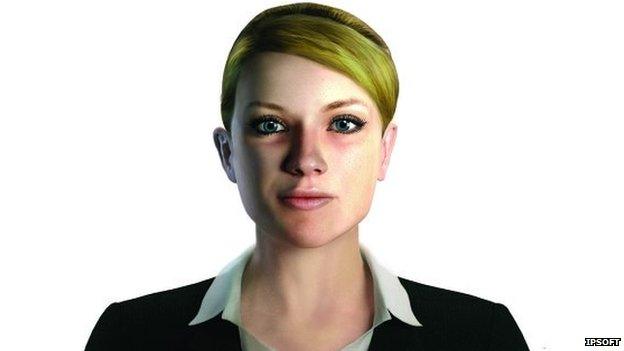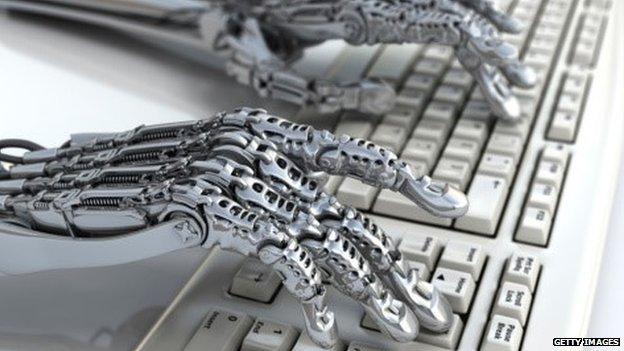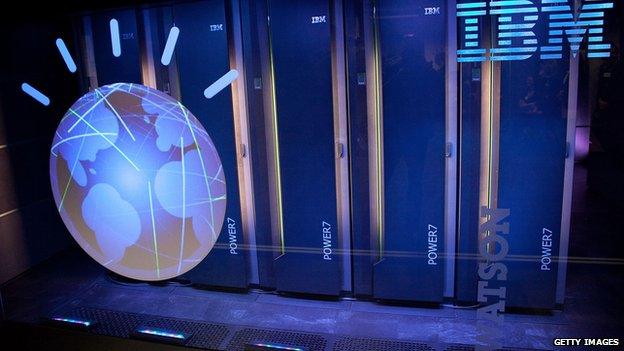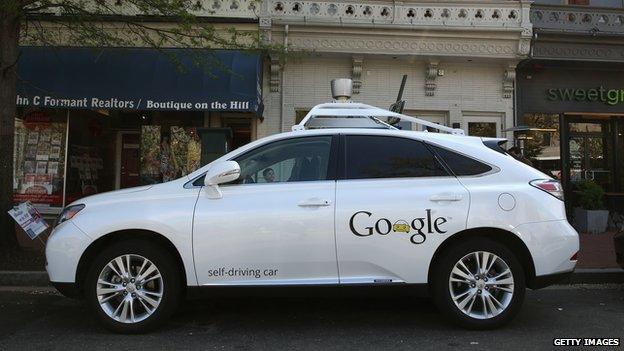Could a big data-crunching machine be your boss one day?
- Published

Could Amelia, the "learning cognitive agent", be your boss one day?
I'm on a date with Amelia. She's neatly dressed, emotionally intelligent and whip-smart.
But she's a little too virtual for my tastes.
Amelia is a "learning cognitive agent", according to her creators IPSoft - like one of those virtual customer service helpers that pop up on corporate websites.
Only not so dumb and a lot less irritating.
But one day, she could end up being your boss, her makers believe.
Machine learning
Amelia can swallow textbooks whole, speak 20 languages, understand concepts and learn from her mistakes. And she can be replicated any number of times.
On my screen I see her absorb a complex engineering manual in 14 seconds then immediately answer questions such as "What are the symptoms of a bent drive shaft?" and "What causes high power demand?"
This may be a far cry from Scarlett Johansson's uber-intelligent operating system Samantha in Spike Jonze's sci-fi film, Her, but it's the future, says Chetan Dube, IPSoft's chief executive.

Are there any limits to what robots could do in the workplace?
The key to Amelia's intelligence is that she can understand what you mean even if you ask the question several different ways - "what is meant, not just what is said", as Mr Dube puts it.
And if she doesn't know the answer she can refer to human agents for help, observe how they handle the issue, then learn the answer for next time.
This ability to interpret context, problem solve and learn is fundamental to automating many of the business processes now performed by humans, usually in large call centres, he believes.
"Machine intelligence is starting to rival human intelligence," he asserts.
Algorithm director
This machine learning intelligence is starting to work its way into the boardroom.
For example in May, a Hong Kong-based venture capital company appointed an algorithm to its board of directors, external.
Deep Knowledge Ventures (DKV) decided that a program, Vital, should have a say in what companies the firm invested in, based on its ability to analyse huge amounts of relevant data.
Vital was developed by Aging Analytics, a UK research agency providing life science market intelligence to pension funds, insurers and governments.

IBM is developing a version of its Watson supercomputer that could take part in boardroom discussions
DKV says it has a "long-term goal of developing the software to a point it is capable of autonomously allocating an investment portfolio".
And IBM, the tech giant behind the Watson supercomputer - famous for beating contestants on the US quiz show Jeopardy - is developing a version of the brainbox that could contribute to board meetings and help develop strategy.
Boardroom Watson would be able to transcribe everything said in a meeting, show answers to research questions on a big screen, and also come up with its own suggestions consistent with company strategy based on algorithms and big data analytics.
Worryingly for some, IBM says Watson would also be able to analyse the contributions made by each board member for usefulness and accuracy.
Irrational
So does this mean Amelia, Watson and their artificially intelligent siblings are threatening to take over completely?
The strength of computers and smart machines lies in their ability to analyse vast data sets and make decisions based on evidence alone.
Human judgement is often clouded by irrationality, emotion and imperfect knowledge.

Will we be happy to let computers make decisions for us in self-driving cars?
For example, when it comes to self-driving cars, proponents argue that letting machines make decisions for us could save lives by reducing the number of road accidents.
A sensor-laden car wirelessly linked up to a traffic monitoring supercomputer would avoid dangerous situations, display much quicker reactions, keep to speed limits, and never succumb to road rage, they argue.
Creative touch
But what are the limits of the machine?
Optimists believe smart robots and cognitive agents will rid us of the unskilled tasks and let us get on with what we humans are really good at - being creative.
"Today, most of us are enslaved to the common chores that occupy 80% of our time," says Mr Dube.
"Cognitive agents will free us from the mundane and allow us, or prompt us, to elevate ourselves into higher value creation - something that requires more creative thinking."
Tom Austin, of research company Gartner, agrees: "Robots can free workers for higher-priority tasks and those tasks that require the greater creativity and adaptability people provide in non-routine situations."
But data analytics and algorithms can also lead us down blind alleys, believes James Quincey, Coca-Cola's Europe group president.
"It's easier to get lost in all the data - it can help us create a better yesterday rather than a better tomorrow," he said at a recent Institute of Directors convention at the Royal Albert Hall in London. "We still need to rely on our gut instinct and develop a richer, more instinctive understanding of the consumer."
Data managers?
And could machines ever really manage people?
Data analytics will certainly have a bigger part to play in quantifying employees' performance and assessing their strengths and weaknesses, experts believe. Even psychometric testing can be automated.
"Data scientists, people from social science, computer scientists, people from HR [human resources], former consultants - these are the groups that are really going to shape how companies will work and grow," says Ben Waber, chief executive of Sociometric Solutions, one of the contributors to a recent report called The Future Workplace, external.
But when it comes to human skills such as intuition, lateral thinking and emotional intelligence, machines lag far behind.
"Machines can at best be run-of-the-mill managers," says Mr Dube. "Thinking creatively, out of the box, for implementing better business outcomes tomorrow is a domain where, today at least, man reigns supreme."
It may be some time yet before Amelia conquers the world.